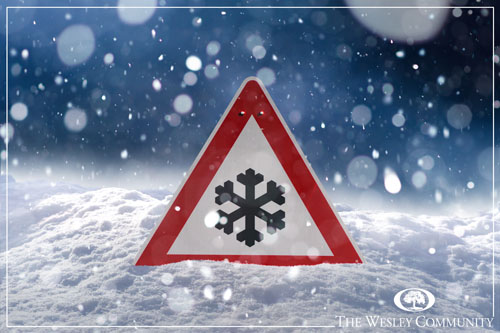Winter presents unique challenges to seniors. Learn more about them and how to keep an older family member safe.

Staying independent as you grow older requires a combination of preventive steps. From health screenings to a well-balanced diet and exercise, lifestyle impacts how well you age. Another issue to address is safety. This is especially important in winter, which can present many unique challenges for seniors.
Help the senior in your life stay out of harm’s way by sharing these winter safety tips with them.
Winter Safety Tips for Saratoga Springs Seniors
Prevent injuries from slips and falls.
Falls are the leading cause of injury for seniors. More than 1.6 million older adults find themselves in the emergency room for fall-related injuries. That translates to one in four seniors. Winter can be especially dangerous.
A few ways you can help an older loved one stay safe during the icy, snowy days of winter include:
- Plan for snow removal: If a family member isn’t able to help, hire a landscaping service to keep walkways and stairs free of ice and snow. If your loved one has a tight budget, call the local office of the Area Agency on Aging . They often have resources to help seniors with these types of services.
- Purchase sturdy footwear: Shoes and boots with good traction are essential for winter safety. If your family elder walks with a cane, be sure it has a skid-proof tip to keep them safe.
- Exercise regularly: Strength and balance training exercises, such as tai chi and chair yoga, also reduce the risk for falls. Both can be easily performed in the safety of a senior’s home when cold winter days make it difficult to drive to a fitness center.
- Move slowly and steadily: Small, sturdy steps are typically safer. Encourage the senior to take their time navigating their way around, especially when they are outdoors.
Have a plan for overcoming the cold.
Because they often have poor circulation, seniors may be susceptible to frostbite and hypothermia. They may need to wear more layers of clothing to feel warm, whether they are indoors or out.
- Wear warm outdoor gear: Make sure your loved one has plenty of warm outdoor gear, including a heavy coat, mittens, scarves, sweaters, hats, and boots.
- Dress in layers: Another way to stay warm during the winter is to dress in layers. Help the senior plan a winter wardrobe that allows them to take clothing on or off as they go in and out.
- Keep an emergency bag in the car: If your family member still drives, encourage them to pack a safety bag for their vehicle. Warm clothing, granola bars, and water are musts. A cell phone charger is another.
Conduct a home safety check.
Finally, make time to evaluate your family member’s home for potential fire or safety risks. According to the National Fire Protection Association, seniors age 65 and older are twice as likely to be injured in a fire. You can take steps to lower the risk, including:
- Inspect smoke and carbon monoxide detectors: Check to be certain all smoke alarms are working, and replace batteries. Do the same for carbon monoxide detectors. If you are in doubt about how many to have in your home, call your local fire department. Many will conduct an in-person assessment of a senior’s home.
- Use space heaters safely: Many people like the convenience and affordability of space heaters. They can help keep a senior’s home warm and cozy when used properly. That typically means keeping curtains, bedding, towels, and furniture at least three feet away from any space heater.
- Avoid extension cords: When people live in older homes that don’t have many electric outlets, they often rely on extension cords. Not only are they a fire risk, they can also present a fall hazard. Talk with an electrician about adding outlets, if necessary.
Bookmark the “Senior Strategies” Blog
If you found this article helpful, we encourage you to bookmark this blog and stop back often. We update it throughout the month to give local seniors and their families the latest news on aging, senior living, caregiving, and more.
Should you have a question about senior care, call us today at (518) 587-3600. We’ll be happy to help!

